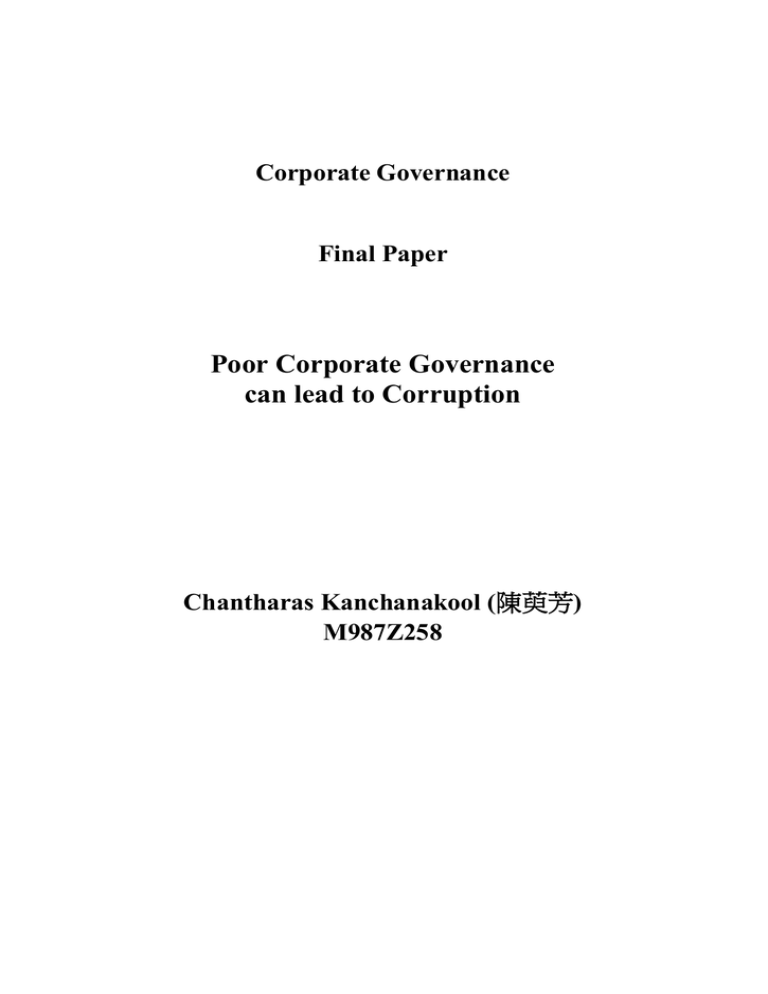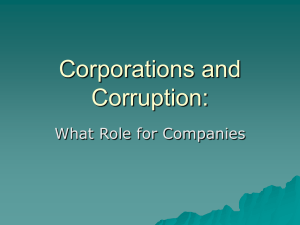Poor Corporate Governance can lead to Corruption Corporate Governance
advertisement

Corporate Governance Final Paper Poor Corporate Governance can lead to Corruption Chantharas Kanchanakool (陳萸芳) M987Z258 Corporate Governance has emerged as a major policy concern in every industry, governmental and private, especially in regarding financial business where investors put their money into those organizations. Policy makers around the world have another important reason to be concerned with corporate governance: poor corporate governance also breeds corruption (Xun Wu 2005). As Corporate Governance regards of policies, processes and it also distributes rights and responsibilities of participants and stakeholders, it effects the way and direction one organization administered. In an organization with poor corporate governance, it is easy for a stakeholder especially in a high position to offer or be offered bribery. An organization can do bribery with public officials to avoid a definite cost or to gain some advantages, for example to gain public contracts in a bidding process. Internally, one stakeholder can do bribery or offer special preferences to his superior in order to get a position or privileges in the organization. In this case, it could be vice versa when a superior could offer a privilege gain to his subordinate in order to get something in return. In other words, bribery can happen in multi-level of agents involved. Even a top management, for instance, is strictly abided with the ethics; cases happen that the lower level operation can still commit bribery without an acknowledgement of their top management. Poor Corporate Governance could also be referred to misuse of public office for private gain or unfairly treatment. This also includes the access to any inside information that allows an advantage to insiders to be able to convey the message to the outsiders. Inside shareholders may also have controlling stakes in multiple firms, enabling them to redistribute the costs and benefits of bribery practices among a set of different firms—a strategy that can be detrimental to the outside shareholders in these firms (Xun Wu 2005). However, although bribery and misuse of public office or private gain could benefit the organization or such person in a significant degree, it also leaves a future risk, costs and also criminally liable for the bribery involvement to the person who commit it, the stakeholder, and the organization. The case has it when an Ex-Prime Minister of Thailand, Mr. Thaksin Shinawatra, is facing two charges of corruption which dated to his time in office and separate charges of concealing assets. In addition, he and his wife Pojamarn are facing charges stemming from a Bangkok land deal where his wife, in the real estate transaction, allegedly purchased undeveloped land for about a third of its estimated value, and an alleged stock concealment plan. Shinawatra could receive a maximum of 15 years in prison. Thaksin Shinawatra is a Thai businessman who had become the 23rd Prime Minister of Thailand from 2001 to 2006. In 2006 he was deposed in a military coup while he was abroad and then fled after being convicted with several charges especially on the conflict of interest. Born in Chiang Mai Province, in the north of Thailand, he began his career in the police before resigned and became a successful telecom entrepreneur. He is said to be one of the richest people in Thailand, with billions of dollars in wealth. By winning the only single national satellite concession, Thaksin got monopoly on the national telecommunication business. He entered politics in 1994 and founded the populist Thai Rak Thai (TRT) party in 1998 by buying corrupt politicians who were good at vote-buying to consolidate into a single TRT party which committed extensive electoral frauds to win the house. After a landslide election victory in 2001 with near absolute majority, Thaksin went on to be a full blown civilian dictator as he became prime minister, the country's first to serve a full term. However, the Shinawatra government also faced allegations of corruption, authoritarianism, treason, conflicts of interest, acting non-diplomatically, and muzzling of the press. He, in fact, was charged against corruption since the beginning of his term. Regarding two of his cases charged against him recently, one is real estate transaction; the other is an alleged stock concealment plan. On the stock concealment case, the Assets Examination Committee (AEC) has investigated the case on policy corruption involving Shin Corp. Then the attorney-general has filed a criminal lawsuit against Thaksin Shinawatra, accusing him of abusing power while serving as prime minister by converting telecom concessions to benefit Shin Corp and causing damage to the state worth Bt66 billion. The lawsuit alleges that Thaksin violated the law by holding state concessions through his stock-ownership concealment in Shin Corp while he was prime minister. He gained unusual wealth in Shin Corp by having state agencies convert the telecom concessions to excise tax to benefit Shin Corp. TOT and CAT Telecom, who awarded the concessions to the subsidiaries of Shin, stood to lose Bt41.95 billion and Bt25.99 billion respectively from the conversion of the concessions. The AEC has found that Thaksin and Pojaman still owned Shin Corp throughout the time Thaksin was serving as prime minister. It was from February 2001 up to the sale of the company in January 2006. The couple allegedly used their children, Pojaman's brother, and Thaksin's sister, as well as Ample Rich Investment Ltd and Win Mark Ltd as nominees to conceal their real ownership of 1,419 million shares, or about 49 per cent, in Shin Corp. The Shin Corp case involves alleged stock concealment, tax evasion and policy corruption to increase the value of Shin stocks. As for the second case in the real estate transaction, Thaksin and his wife Pojaman were already on trial at the Supreme Court's Criminal Division for Political Office Holders in a separate case involving Pojaman's purchase of a prime plot in the Rachadaphisek area in Bangkok from the Financial Institutions Development Fund. In this case, Thaksin was charged with violating the law by using his high office to endorse the deal with the FIDF, a state institution. As of now, Thaksin and his ex-wife are still in exile abroad refusing to return to Thailand to face all the charges. In conclusion, Good corporate governance is an essential tool in conducting one organization, no matter how big or small it is, as it can help reducing the degree of corruption by addressing both the principal–agent problem and the problem of coordination. The principles of good corporate governance such as accountability and transparency not only can improve firms’ operating performance, but can also reduce the level of corruption by imposing more constraints on both the corrupt officials and the corruptors from the private sector (Xun Wu 2005). Reference Wu, Xun. April 2005. Governance: An International Journal of Policy, Administration, and Institutions, Vol. 18, No. 2. © 2005 Blackwell Publishing, 350 Main St., Malden, MA 02148, USA, and 9600 Garsington Road, Oxford, OX4 2DQ, UK. p. 151–170.

